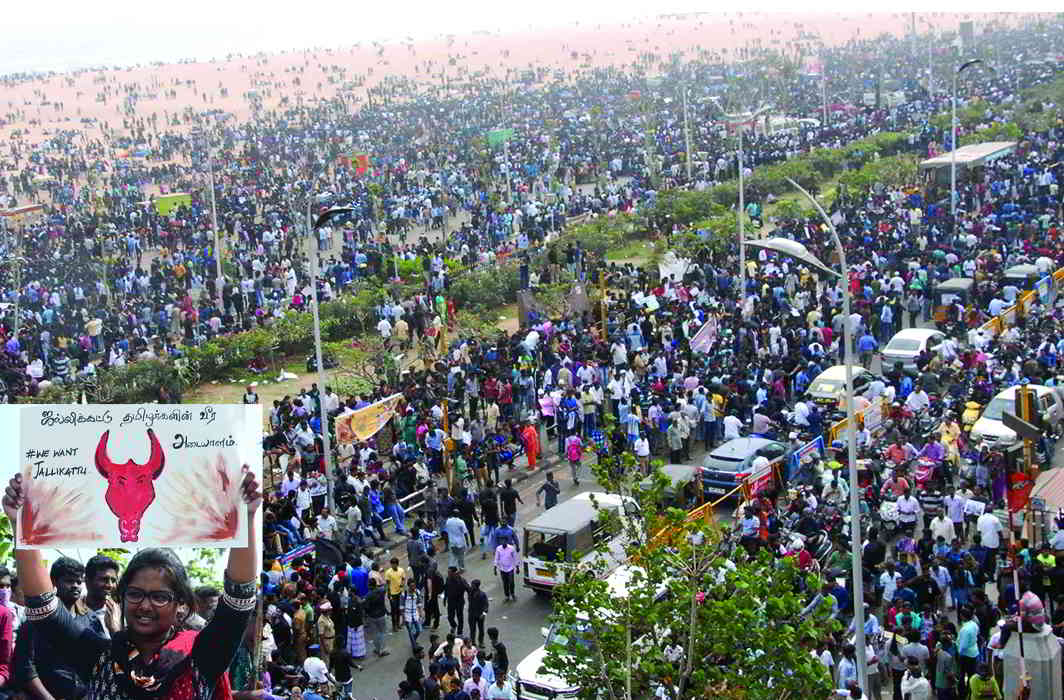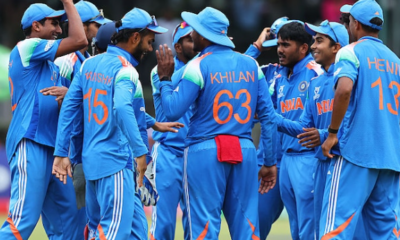[vc_row][vc_column][vc_column_text]Making sense of mass protests against the ban on jallikattu
SS Kumar
The jallikattu protests animating Tamil Nadu over the last week are not really about jallikattu: anything but. And it’s not about spontaneity, again.
Of the tens of thousands gathered at the Marina—under the benign and approving eye of the state police—it’s unlikely even one percent is likely to have seen a jallikattu performance. If it was about anything, it was about Tamil pride: read, a palpable sense of Tamil victimhood.
T Ramakrishnan, the son of the noted Tamil writer Ashokamitran, a senior Hindu journalist and a keen political observer, suggested: If J Jayalalithaa were alive, this wouldn’t be happening. How so? The jallikattu ban cropped up in 2015 and 2016, but roused no passions as long as Jaya was around; after that, it was an issue waiting to happen. Whether this says anything about the Tamil psyche and its yearning for a strong imperious leader like her, MGR, or M Karunanidhi or not, there is a perception that Tamilians’ maryaadai (respect, pride) was at stake. This, in essence, is what it’s about.
So, ordinary Tamils chafing at what they perceive are slights … Karnataka defying the Supreme Court and withholding Cauvery water, Kerala’s intransigence over the Mullaperiyar dam, and a feeling that the central government was not sympathetic to the state… waiting for an issue to vent all that pent up feeling.
And happen it did after an extraordinary series of circumstances. The immediate provocation was a report that spread like wildfire that central government offices would stay open in the state on Pongal day with Tamil staff allowed the day off, when the practice was that central government offices were closed for Pongal… as for other regional holidays in other states.
That marked the start: in no time, it spread from the traditional jallikattu areas in central Tamil Nadu—Alanganallur in Madurai district is the epicentre of the jallikattu tradition, a hangover from a feudal sport of the mirasdars/zamindars, much like the gladiatorial contests of ancient Rome. No more, no less… and certainly not intrinsic to Tamil culture, or the state as a whole—jallikattu is unheard of in the Nilgiris district; the northern districts of the state where Chennai lies; or the deep south.
And yet, groups of protesters in every locality, every major traffic junction, every neighbourhood are raising the slogan “jallikattu vendum” (we want jallikattu) as if their birthright was being snatched away.
On the Marina, the crowd chanted, “Tamizhan endru sollu da, thalai nimirnthu nillu da (Say you’re a Tamil, hold your head up high!).” On Friday, January 20, the swelling youth protest against the ban on jallikattu (the sport of bull taming, literally the (salli) coins tied to a bull’s horns (kattu) entered into its fourth day—leaving the government scrambling to find a solution.
How much of a role did social media play in propelling the demonstrations? Many have cited WhatsApp as a key driver—interestingly, as I was writing this, a mail dropped into my box, extolling Tamil as the only surviving classical language (with a link to a Hindu article), and concluding with the ringing declaration that “Tamilian is not identified by caste and community, but a powerful organised civilization.” And the punchline at the end: Tamilan endru sollada. Coincidence? Hardly.
But the anonymous e-mail from [email protected] made an interesting point—the students seem united by a Tamil identity, an identity transcending caste and community, so ingrained in Tamil society, just below the surface, seething, simmering… and ready to explode into violence. One of the striking things is the sheer numbers of women and children at the protest, and the sight of scores of young Muslim women with head scarves. Yes, community transcended.
Spontaneity? The organisation was far too efficient and streamlined for this to be the case. Food packets—and the well-loved biryani—kept arriving by the truckloads, with teams of volunteers at hand to distribute them; chai served up as a welcome drink; mobile toilets and caravans for women to freshen up. No, it was being orchestrated; but by who?
One clue: Narendra Modi has quickly become the villain of the piece. If Modi and the BJP, scented an opportunity after Jaya’s passing to make inroads, it’s certainly been set back. Many in political circles believe it’s an attempt by Christian and Muslim groups to foster a pan-Tamil identity to keep Hindutva forces from regrouping.
If that is indeed the case, then the strategy has been a smashing success; established parties have been left behind and are now scrambling to catch up, lest they lose their relevance too. The ruling AIADMK, DMK, the Left, the Pattali Makkal Katchi, even fringe pro-Eelam and Dalit outfits, who’ve always exerted an influence all out of proportion to their numbers, must be scratching their heads.
Although the Modi government has approved an ordinance brought about by the Tamil Nadu government in favour of jallikattu but what it has done is to unleash Tamil identity politics again. The last time it happened, during the anti-Hindi riots of 1965, it led to the decimation of the Congress and the rise of the Dravidian parties: a tectonic shift. Will jallikattu do the same?
—the writer is a former associate editor of The Hindu, The Hindu
BusinessLine and Acting Editor of The New Sunday Express
Lead picture: Protestors at Marina Beach, Chennai, demanding that the ban on jallikattu be lifted. Photos: UNI[/vc_column_text][/vc_column][/vc_row]


 India News22 hours ago
India News22 hours ago
 Latest world news22 hours ago
Latest world news22 hours ago
 India News22 hours ago
India News22 hours ago
 Latest world news16 hours ago
Latest world news16 hours ago
 Cricket news16 hours ago
Cricket news16 hours ago
 India News17 hours ago
India News17 hours ago
 Latest world news12 hours ago
Latest world news12 hours ago
 Cricket news11 hours ago
Cricket news11 hours ago















